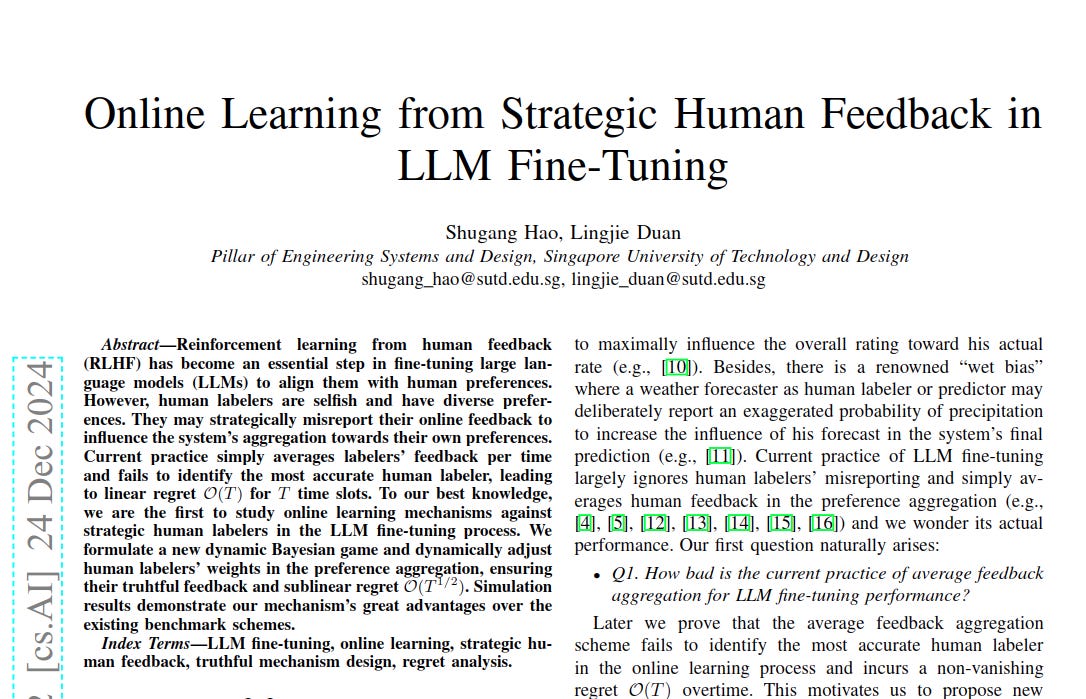"Online Learning from Strategic Human Feedback in LLM Fine-Tuning"
Below podcast on this paper is generated with Google's Illuminate.
https://arxiv.org/abs/2412.16834
The paper addresses the problem of strategic misreporting by human labelers in Reinforcement Learning from Human Feedback (RLHF) for LLM fine-tuning. Current methods that average feedback are vulnerable to manipulation and fail to identify accurate labelers.
This paper introduces a dynamic online learning mechanism. It adjusts human labeler weights based on feedback accuracy to ensure truthful reporting and reduce regret.
-----
📌 The online weighted aggregation mechanism effectively addresses strategic manipulation in RLHF. By dynamically adjusting weights, it incentivizes truthful feedback from human labelers.
📌 The sublinear regret bound, $\mathcal{O}(T^{1/2})$, is a significant theoretical contribution. It proves the efficiency of the mechanism in converging to optimal feedback aggregation over time.
📌 Weight update rule, based on squared error, offers a practical and computationally light method. It can be readily integrated into existing RLHF pipelines to improve robustness.
----------
Methods Explored in this Paper 🔧:
→ The paper proposes an online weighted aggregation mechanism for LLM fine-tuning from human feedback.
→ This mechanism dynamically adjusts each human labeler's weight based on the accuracy of their feedback in the previous time slot.
→ The weight update rule is defined as: `w_i^(t+1) = w_i^t * (1 - alpha * (1/m_t) * SUM_j=1^m_t (P_hat_i(y_lj^t > y_lj'^t|x_j^t) - p_j^t)^2 )`.
→ Here, `alpha` is a step-size parameter, `m_t` is the number of prompts, `P_hat_i` is the feedback from labeler i, and `p_j^t` is the realized binary preference.
→ A smaller squared difference between feedback and realized preference leads to a smaller weight reduction, rewarding accurate labelers with higher weights over time.
-----
Key Insights 💡:
→ The proposed online weighted aggregation mechanism is truthful. This means human labelers are incentivized to provide honest feedback to maximize their long-term influence on the system.
→ The mechanism achieves sublinear regret, specifically $\mathcal{O}(T^{1/2})$. This indicates that the time-average regret vanishes as the number of time slots (T) increases, showing efficiency in learning over time.
→ The dynamic weight adjustment allows the system to identify and prioritize more accurate human labelers, improving the overall feedback aggregation.
-----
Results 📊:
→ Simulations show the mechanism dynamically allocates higher weights to more accurate human labelers over time.
→ The proposed mechanism significantly reduces time-average regret compared to benchmark methods like average feedback and median aggregation.
→ The time-average regret of the proposed mechanism decreases as the time slot number (T) increases, approaching zero, unlike benchmark schemes with non-vanishing regret.


